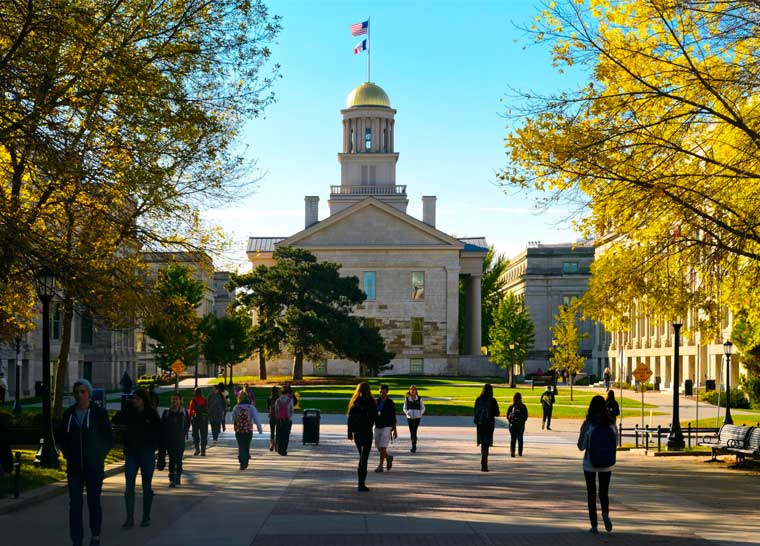Pre-Law
The road to law school starts here.
UNI’s strong academic programs will prepare you to succeed in the law school of your choice. Our faculty pre-law advisors will assist you through all stages of preparation including course selection, LSAT preparation and application assistance.
A dedicated Pre-Law Club offers additional support through discussions with local attorneys and judges, presentations from law school representatives, and studying/application resources.
UNI has also developed 3+3 program partnerships with the University of Iowa College of Law and Drake University Law School to make the process of earning a law degree more efficient. These accelerated programs allow you to complete a bachelor’s degree at UNI and a Juris Doctorate at Iowa or Drake in six years rather than the normal seven.


3+3 Partnerships
Earn your Juris Doctorate in six years rather than seven at the University of Iowa College of Law or Drake University Law School

Personal Advisors
Pre-law advisors are here to assist you through all stages of law school preparation

Pre-Law
Club
UNI Pre-law Club will connect you with working lawyers and introduce you to law school representatives to help with the application process
Preparing for Law School
At UNI, you can be pre-law with any major. No matter what your path of study, our pre-law advisors will help you get law school ready.
According to the American Bar Association, the following skills provide a sound foundation for law school:
- Critical reading
- Writing and editing
- Oral Communication and listening
- Problem solving and logical thinking
- Organization and time management
- Relationship-building and collaboration
Common Pre-Law Majors
Economics
Economics often involves topics like wealth, finance, recessions and banking, leading to the misconception that it is all about money. Actually, an economics education helps you understand historical trends, interpret today’s headlines and make predictions for the coming years.
Political Science
As a political science major, you'll learn how to to take on and talk about important and complex issues related to government, power and social change. Political science graduates often go on to law school or graduate programs that focus on international diplomacy, political science, public administration and public policy.
Philosophy
Philosophy examines such fundamental human questions as the nature of knowledge, rational thought, ethics, beauty, justice, language, scientific inquiry and the human self. Students of philosophy develop a mastery of analytical thinking skills and effective written and oral communication, giving them a competitive edge as they seek careers in a global marketplace.
Criminology & Criminal Justice
UNI offers the most established criminology and criminal justice undergraduate degree in the state of Iowa. Throughout the program, courses emphasize the importance of research-based knowledge, multiple theoretical perspectives, real-world practice, policy analysis and ethical decision-making.
History
The Department of History offers a student-centered learning experience that connects the past to the present. Students are trained to think critically with the historical contextualization necessary for 21st-century cultural competence, citizenship and career success in a variety of fields.
Psychology
The human psychological process is a complicated, remarkable system. A degree in psychology dives into this system by teaching students how memory and language influence our thoughts, how our emotions guide our actions, how other people influence us, and ultimately, how we can use psychology to improve human functioning.
Legal Studies Minor
A minor in legal studies equips students with the ability to comprehend and critically evaluate written arguments, to make one's own arguments and support them with evidence and logical reasoning, and to communicate effectively, both orally and in writing.
Partnerships with Drake University Law School and the University of Iowa College of Law are designed for you to complete both a bachelor’s degree at UNI and Juris Doctorate in six years, rather than the traditional seven years.
You may choose any major to complete the 3+3 program, but it must be one that will allow you to complete its requirements before the end of your junior year. This will require careful planning and coordination with your academic and pre-law advisors.

The Old Capitol located on the University of Iowa campus. (Photo courtesy of the University of Iowa)
Pre-Law FAQs
Pursuing your law degree can be timely, costly and confusing process. Below are some answers to the most frequently asked questions by students and parents.
- What can I do with a law degree?
You don’t need to have a clear idea of what kind of legal career you want when you're applying to law school. Still, it never hurts to start thinking about such things early, and it may help you make up your mind about whether you want to attend law school.
Law school graduates also have opportunities in a wide variety of fields: media, public relations, public administration, management, law enforcement, and foreign service, just to name a few.
- Should I go to law school?
People’s reasons for going to law school vary. Many who attend law school are driven by a desire to help people. Lawyers help people navigate many different kinds of problems, including estate planning, immigration, family and custody issues, buying or selling real estate, setting up and running businesses, and complying with tax laws or government regulations. Others attend law school so they can pursue public service or work to affect social policy. Others see a legal profession as a gateway to a higher-class lifestyle and a way to pursue high-paying jobs in corporate America. Some may be drawn into the law as a result of interest in particular subjects (e.g., the environment, intellectual property), while others may be primarily motivated by the prospect of helping people. Some are attracted to law school by the intellectual challenge.
If, however, the best answer you can come up with is “I can’t figure out anything else to do” or “Because my parents are lawyers,” due to the tremendous amount of time, effort and money law school requires,you might want to think a little harder.
- How do I pay for law school?
Most students rely heavily on student loans to finance their legal education. The most commonly relied-upon loans (and the ones the most flexible payment options), are federal student loans. Many schools also provide a number of merit-based scholarships, but the number of scholarships available and their amounts vary considerably from school to school.
Financing your legal education can be made easier by the decisions as an undergraduate. Keeping your credit card debt as low as possible, minimizing your undergraduate student debt and saving money wherever possible can help you keep your law school debt lower.
- Is 3+3 right for me?
In general, students preparing for law school should focus on acquiring skills to prepare them for law school and to succeed in their legal careers. We recommend that you pursue rigorous courses that emphasize reading, writing and analytical thinking.
You should also talk to both your academic and pre-law advisors about the trade-offs that participating in 3+3 might require. For example, due to the accelerated timeline, you may be unable to complete a second major or minor, participate in a study abroad experience, participate in undergraduate research or complete certain internships. Students who acquire these experiences at UNI may enhance their qualifications for both admission to law school and law-school scholarships. Pre-law advisors will help you weigh these considerations in deciding whether the program is right for you.
First and Second Years of Your Undergraduate
- Take interesting and challenging Liberal Arts Core classes. Make sure you’re taking classes that help you improve problem solving, logical thinking, reading and writing skills.
- Talk to your academic advisor about your goals, your possible interest in law school, and how your course of study relates. Plan out course of study to permit light course-load during semester preparing for LSAT.
- Meet with pre-law advisor periodically to discuss interest and goals
- Once choose a major, discuss with academic advisor and pre-law advisor whether any additional courses would be useful to help prepare for law school
- Write a draft of your personal statement at least once each year and get feedback from pre-law advisor
- Attend UNI Pre-law Club events to learn about the legal profession and law school
Junior Year of Your Undergraduate
- Take Elementary Logic (PHIL 1030)
- If possible, plan to take a light course load during semester studying for LSAT
- Visit with pre-law advisor to discuss preparing for LSAT
- Devote at least 200 hours to LSAT preparation
- If you haven’t already, consider internship, job shadow, and/or volunteer opportunities that will help you explore your interests in legal careers
- Attend UNI Pre-law Club events to learn about the legal profession and law school
- Before school dismisses, ask professors to write letters of rec for you.
- Over summer, start on resume and personal statement
- Narrow down list of schools considering applying to
Senior Year of Your Undergraduate
- Take the LSAT no later than September/October.
- By early September, ask professors for letter of rec and provide with any information they request to help them write it
- Write and edit resume and personal statements. Be sure to get input from pre-law advisor on drafts
- Visit with pre-law advisor to finalize list of schools to apply for, in light of LSAT scores
- Submit applications no later than Thanksgiving
- Visit with pre-law advisor as you make final decision about where to attend.
- Notify school that you’re accepting offer and pay seat deposit
Most of our graduates stay in state and attend Drake University Law School or the University of Iowa College of Law, but in the last 10 years our graduates have attended law schools around the country, including:
Creighton University School of Law
Florida State University College of Law
George Washington University Law School
Harvard Law School
Marquette University Law School
Mitchell-Hamline School of Law
New York University School of Law
Pepperdine University School of Law
Stanford University Law School
Texas A&M University
University of Denver Sturm College of Law
University of Kansas School of Law
University of Michigan Law School
University of Minnesota Law School
University of Nebraska College of Law
University of Wisconsin Law School
Washington University School of Law
UNI pre-law alumni have gone on to practice in a variety positions and locations, including:
Neighborhood Defender Service
Assistant Attorney General, Colorado
Chevron
University of Arkansas
Caterpillar
Associate at JONES DAY, Detroit
Policy Counsel, Data Privacy, Future of Privacy Forum, Washington, D.C.
Asst. State Attorney, DuPage County, IL
First Amendment & Employment Litigator, Foundation for Individual Rights & Expression
Assoc. Attorney at Sheehy, Ware, Pappas & Grubbs, San Antonio, TX
Corporate Assoc. Attorney at Faegre Drinker, Minneapolis
Assoc. Attorney at Timmer & Judkins, Johnston, IA
Judicial Law Clerk at U.S. District Court for the District of Minnesota
Panther POV
Meet a few of our recent pre-law alums who are already doing great things in the world, thanks to their start at the University of Northern Iowa.



